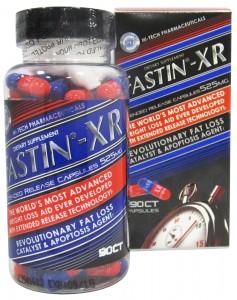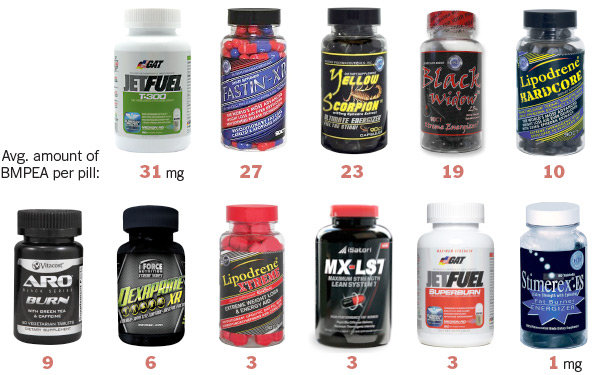
Weight loss supplements have been found to contain amphetamine-like ingredients, and not the plant extract they claim to have on their label. Sold under the names JetFuel T-300, Fastin-XR, and Black Widow they were found to contain a compound called BMPEA – which has never been found tested nor is it found in the shrub Acacia rigidula, a shrub native to Texas.
From the report: Twenty-one brands of Acacia rigidula supplements were analyzed. More than half (11/21; 52.4%) of the Acacia rigidula supplement brands contained BMPEA. The stimulant was present at quantities such that consumers following recommended maximum daily servings would consume a maximum of 93.7 mg of BMPEA per day. Consumers of Acacia rigidula supplements may be exposed to pharmacological dosages of an amphetamine isomer that lacks evidence of safety in humans. The FDA should immediately warn consumers about BMPEA and take aggressive enforcement action to eliminate BMPEA in dietary supplements
Amphetamines can be dangerous leading to strokes, increased hypertension, heart attacks, and death. BMPEA was a synthetic drug manufactured in the 1930’s as a substitute for amphetamines. It was never tested in any human trials. FDA rules that supplements can contain items that are a part of the food supply, or had been sold prior to 1994. Some exceptions apply, but this was not one of them.
USA Today contacted Hi-Tech Pharmaceuticals of Norcross, GA that made the product with the slogan “Found in nature, backed by science” but they did not return the phone calls.
This is not the first time the FDA has found ingredients in supplements, and this is an ongoing issue as there is minimal regulation of these industries, and most rely on self-reporting. They do not have to submit major peer reviewed studies- and some have even submitted college term papers as proof of efficacy. This “hole” in the laws governing your nutrition has been made courtesy of US Congress. Their advocates do not regulate “natural” items – although I doubt any in Congress thinks that synthetic amphetamine is “natural.”
Great Britain declared that Acacia rigidula did not meet European safety standards and would not be sold. Canadian authorities also recalled JetFuel Superburn from Empire Health Distribution because of the amphetamine-like drugs.
Weight loss supplements are widely sold, completely unregulated. In addition to having no peer reviewed studies showing efficacy, they also have no method of determining toxicity and safe dose.
We reported in our blog Vitamins and Supplements: Labels that Lie about how many supplements do not contain the ingredients on the label. In addition our blog Fraudulent Supplements Targeted by New York Attorney General showed how the supplements often did not contain the ingredients on the label.
The FDA has banned a number of Tainted Weight Loss Supplements: FDA Warning because of having some banned prescription ingredients in them, Meridia.
Supplements are a danger to the public, and need strict regulation, but an Act of Congress has allowed them to get away with contamination of ingredients, and outright lies to the public.
Here is the difference:
Drugs are considered unsafe – until proven safe. They must be tested in humans, they must determines what the drug is treating, what drugs it would interact with, and what are the contraindications for the drug – especially in children, as well as pregnant and nursing mothers. In addition there is a mechanism to report any adverse effect of the drug- and every physician is given access to this, as well as every person.
Supplements are considered safe – until proven unsafe.
In 1994, the Dietary Supplement Health and Education Act (DSHEA) defined dietary supplements as a category of food, which put them under different regulations than drugs. They are considered safe until proven otherwise. The DSHEA says that dietary supplements cannot contain anything that may have “a significant or unreasonable risk of illness or injury” when the supplement is used as directed on the label, or with normal use if there are no directions on the label.
A dietary supplement is considered “new” if it contains an ingredient not recognized as a food substance, unless it was sold as a supplement before October 1994. If it is new, the manufacturer must provide the FDA with reasonable evidence that the new ingredient is safe before the supplement is marketed to the public.
But manufacturers are not required to test new ingredients or supplements in clinical trials, which would help find risks and potential interactions with drugs or other substances. The DSHEA gives the FDA permission to stop a company from making a dietary supplement, but only when the FDA proves that the product poses a significant risk to the health of Americans. This means they are found unsafe only after they cause harm. This is the reverse of the way prescription and non-prescription drugs are handled.
Dietary supplements are usually self-prescribed, so there’s no controlled system for reporting bad reactions and side effects. Doctors and patients can report problems, but are not required to do so. If a supplement has unknown side effects or interactions with other drugs, foods, or supplements, they are not likely to be discovered as quickly as those of new drugs on the market. – from cancer.org

- Image from NY Times. Concentration of BMPEA in various supplements
REFERENCES:
An amphetamine isomer whose efficacy and safety in humans has never been studied, β-methylphenylethylamine (BMPEA), is found in multiple dietary supplements
Pieter A. Cohen1,4,*, Clayton Bloszies2, Caleb Yee3 andRoy Gerona3
Article first published online: 7 APR 2015
